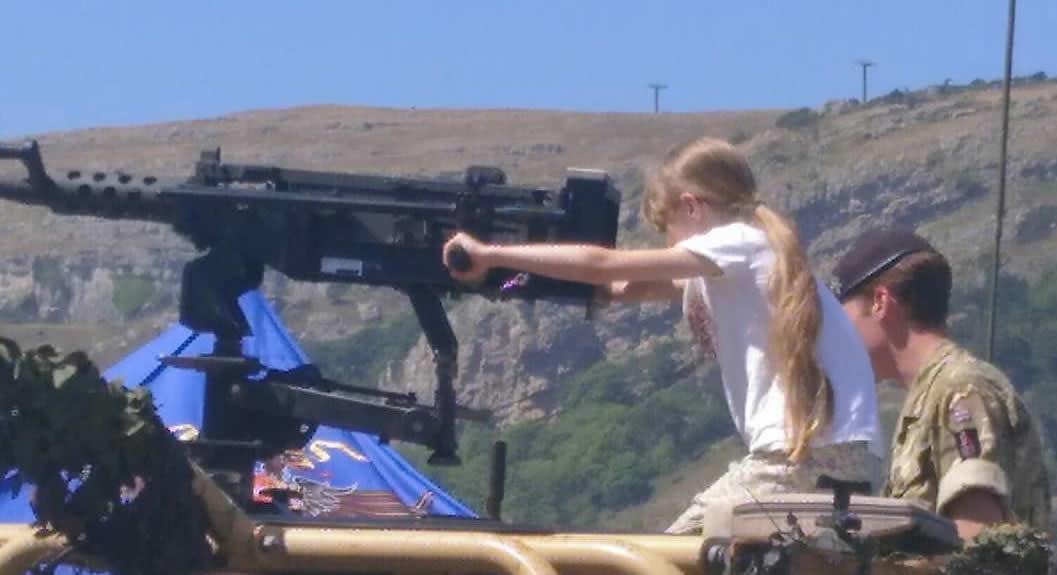Online gathering sees enthusiasm for resisting everyday militarism

Online gathering sees enthusiasm for resisting everyday militarism
An online gathering has seen people from various parts of the UK and beyond share ideas and plans for challenging everyday militarism.
An event organised by the Peace Pledge Union this evening (Monday 7th September) saw a panel of speakers share thoughts on the role of militarism in Britain today, before the discussion moved on to questions and comments from the many other people present.
The PPU makes a priority of campaigning against everyday militarism, pointing out how it has been on the rise in recent years - with the creation of Armed Forces Day, the Cadet Expansion Programme in schools, and local authorities signing up to the so-called "Military Covenant".
First to speak at the event was Azariah France-Williams, drawing the links between militarism and racism. Azariah is a Church of England priest, a peace activist and author of a new book on institutional racism.
He spoke of how militarism and racism both involve a premise that some people's lives are not worth as much as others. Making links with poverty and class, he said, "One of my worries with militarism and racism is that there's a recruitment drive to those who are poorer in society, and that often includes black and brown people, who are seen to be worth less".
He was followed by pacifist LGBTQ rights campaigner Rachel Melly, a city councillor in York, who spoke of how armed forces and arms companies seek to portray themselves as feminist and pro-equality.
Rachel spoke of the often successful resistance to attempts by arms companies to sponsor LGBT Pride events, and of armed forces to stage military marches at the front of Pride parades. She emphasised that nobody objected to arms company employees and armed forces personnel attending Pride as individuals but that lots of people are resisting the misuse of Pride to pinkwash the image of the military or the arms trade.
"If you're LGBTQ then Pride is for you," said Rachel. "It's not for arms companies and armed forces to improve their image."
Tomos Williams-Mason, an 18-year-old pacifist from the Swansea area, spoke of his experience of militarism in his school and community, and how the armed forces are targeting young people today.
Speaking of how the armed forces are portrayed, he said, "The image that is presented to us in thousands of schools every year is false". He added, "The image that the army creates heroes and doesn't harm vulnerable people is false." Tomos warned against viewing the military through "rose-tinted glasses sprayed with blood".
Attenders at the meeting included Donald Saunders, a 95-year-old pacifist in North Wales who was a conscientious objector in World War Two. He compared his own experience resisting militarism as an 18-year-old in 1943 with Tomos' experience today, noting similarities as well as differences. He warned that pacifists should be ready to resist any reintroduction of conscription.
Other topics that were raised included white poppies, disability rights and the stirring up of hatred towards migrants and refugees. Several people raised questions about effective campaigning and discussed how diverse people and groups can work together and support each other.
The meeting welcomed a question from a serving soldier who said he "profoundly disagreed" with the speakers but was glad they were willing to discuss his question.
He suggested that it was only because of wars over the last 100 years that people were able to have free discussions today. In response, the speakers suggested that much military activity had more to do with restricting freedom rather than promoting it. Rachel pointed to the current work of UK armed forces in training Saudi forces who are bombing Yemen.
Azariah spoke of the effects of British militarism on people elsewhere in the world over the last 100 years, saying, "Their freedom has been taken away by the way we have exercised our freedom... And there are a number of people in the UK who feel this is not a free place for them".
There was then discussion of some recent successful community campaigns. Examples included Glasgow, where resistance to an arms fair led the City Council to rule out hosting an arms fair again. Another prominent example was Leicester, where campaigners persuaded local authorities to stop the armed forces from inviting children to handle weapons.
It was emphasised that the Peace Pledge Union wants to know what their members and allies would find helpful in terms of resources, events or training to help them to tackle militarism in their own communities. PPU members and supporters are encouraged to email mail@ppu.org.uk with their ideas and requests (whether or not they were at the meeting).
The PPU is planning other online events soon, with more of a focus on equipping people to learn from each other and make plans for active campaigns about militarism. More details will be available shortly.
You can join the Peace Pledge Union at https://www.ppu.org.uk/civicrm/contribute/transact?reset=1&id=2.




